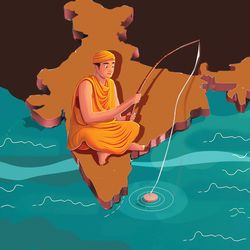Would we like to get Katchatheevu ‘back’? I’ll bet half the fish in the Gulf of Mannar that every leader who wants a vote in Tamil Nadu would say yes.
Narendra Modi, who is seeking a seat or two in the Tamil country for his BJP, says the Congress “callously gave away” the islet to Sri Lanka in 1974. In 2022, M.K. Stalin advised Modi, who was visiting Lanka, “that this is the right time to retrieve Katchatheevu”. The AIADMK moved the Supreme Court in 2008 seeking to get the 1974 treaty nullified. Naturally, all three, as also most other parties in the Dravida land, would like to preside over St Antony’s annual feast in Katchatheevu.
Now comes the real question. Has anyone done anything to get the islet ‘back’?
The leaders would scream yes, and cite a thousand statements they have made in courts (more than 30 petitions), in Parliament, in the public and in cyberspace. But as any schoolboy from the heights of Ladakh to the coast of Rameswaram would know, and as the Lankans have been scoffing from across the Palk Strait, the writ of the Supreme Court of India does not run beyond land’s end in Kanyakumari.
Then which door should they knock at? Simple—the diplomatic doors in Colombo.
Strange as it may sound, in the last 50 years since the Congress “callously gave away” the islet, nobody has asked the Lankans to renegotiate the boundary! The BJP has been in power at the Centre for 16 of these 50 years, the DMK shared power at the Centre for 17 years, and the AIADMK had good ties with several Union governments. Those regimes had illustrious foreign ministers like Atal Bihari Vajpayee, I.K. Gujral, Jaswant Singh, Sushma Swaraj and Tamil-speaking S. Jaishankar, yet none has asked Colombo to reopen the 1974 treaty. Let alone a diplomatic channel, none of them has opened a backchannel or even thrown a bottled message across the Palk Strait.
They know it will be futile. After all, it was Jaishankar’s office that put up a stiff diplomatic lip and told an RTI activist in 2015 that the 1974 agreement “did not involve either acquiring or ceding of territory belonging to India since the area in question had never been demarcated. Under the agreements, the island of Katchatheevu lies on the Sri Lankan side of the India-Sri Lanka International Maritime Boundary Line.” Period.
One may say, the boundary line was based on an understanding reached in 1921-22 when Lord Chelmsford was ruling India and William Henry Manning in Ceylon and both were reporting to the same office of Lord Montagu in London. In the 1970s, Indira Gandhi, alarmed by the sight of the Lankans refuelling Pak war planes during her Bangladesh war and American jets playing war games in Diego Garcia, thought Katchatheevu was a small price she could pay to keep the Lankans on India’s side in her South Asian power play. She simply formalised an understanding that had been there since Chelmsford and Manning, but got Sirimavo Bandaranaike to let Indian fishers to dry their nets on the islet.
Now, would we like to renegotiate the boundaries set by the colonialists and recognised by our own rulers? Two problems. One, expect the Lankans to say, go take a walk across the sea to the isle of St Antony. Two, that walk will land us in the Chinese trap. They are the ones who say that boundaries drawn by colonial rulers need to be renegotiated.
Gentlemen, there is a diplomatic minefield on that little isle. Keep off as far as possible, but join the Lankan fishers at the annual feast of St Antony.
And, as Jesus said, love thy neighbour.
prasannan@theweek.in


